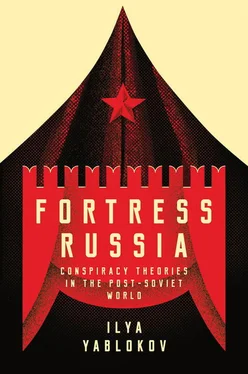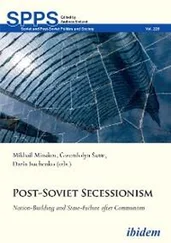The new approach to conspiracy discourse, freed from the old dismissive attitudes, could help us to navigate our way through the complexity of modern politics and understand that conspiracy ideas have some social, even positive functions. They might serve as a legitimate tool for the interpretation of power relationships in the modern world. They could challenge the existing social and political state of affairs to transform it in a positive (or, conversely, a negative) way. They could constitute an important ‘creative response’ to social change. As Fenster (2008, p. 10) argues, conspiracy theories could serve as ‘a means to rally support’ and at the same time delegitimize opponents ‘by branding their beliefs as paranoid’. This new approach, then, is based on the recognition that conspiracy theories can become an important tool for the redistribution of power and an efficient political strategy to expose inequities within the political, economic and social order.
This inevitably leads us to a discussion of the ways in which conspiracy theories are used to persuade the centres of power to redistribute their resources. Populist rhetoric is the principal method of vocalizing conspiracy theories on a political level. Accordingly, Fenster concludes that conspiracy theory is a populist theory of power (p. 89). It possesses an important communicative function by helping to unite ‘the people’ against the imagined ‘Other’ represented by the secretive ‘power bloc’. The ability of conspiracy discourse to express popular fears and hence foster unity among ‘the people’ explains its widespread use in the populist rhetoric of authoritarian and fascist regimes. However, since theories are not confined to authoritarian regimes, particularly in the present day, Fenster defines conspiracy mythmaking as an ‘ideological misrecognition of power relations’ which may occur in any political system (pp. 84–90).
Fenster’s argument rests on the broad interpretation of populism introduced by Francisco Panizza and Ernesto Laclau, who see it as ‘a mode of identification available to any actor operating in a discursive field in which the notion of the sovereignty of the people and its inevitable corollary, the conflict between the powerful and the powerless, are core elements of its political imaginary’ (Panizza, 2005, p. 4). A key feature of this interpretation is the division of society into two antagonistic camps: ‘the people’, united on the basis of popular demand, oppose the ‘Other’, the power bloc; this represents the typical juxtaposition of ‘Us’ versus ‘Them’. In Laclau’s words, these two camps constitute ‘the power’ and ‘the underdog’. ‘The underdog’s appeal is based on popular demands and its role is to challenge the social order and gain power, thereby fulfilling popular demands’ (Laclau, 2005b, pp. 37–8). Populism also performs the function of gathering different elements of the social into a new identity (Laclau, 2005a, pp. 93–101). This reading of populism accepts that it can exist in a democratic society; it can provide a necessary challenge to the existing democratic order when the latter fails to address certain cutting-edge issues.
Populism, according to this interpretation, has an obvious connection to conspiracy theory. The invention of ‘the people’ in its various forms (depending on a given ‘demand’) very often requires a clear and persuasive image of the ‘Other’, and this can be provided by the conspiracy narrative through generation of fear of foreign or internal deception or subversion. This ‘communicative’ function of conspiracy theory plays an important role in political discourses and helps to create political identities. Such discourses also address concerns about the inequities of the social system and occasionally pose a positive challenge to the existing social order (Fenster, 2008, pp. 89–90). As we shall see, this understanding of conspiracy theory will prove useful in analysing Russian conspiracy mythmaking and its place in domestic politics.
As Ortmann and Heathershaw (2012, p. 554) noted, conspiracy theories in the post-Soviet context should be studied as a social phenomenon and a specific discursive approach. Fenster’s understanding of conspiracy theories provides a useful set of instruments with which to analyse the Russian situation. Firstly, it enables us to abandon the traditional reading of conspiracy theories as easily dismissible paranoia, and study the role of conspiracy fears in the process of nation-building and the formation of collective identities. The emergence of nation-states established a path to democracy and set conditions for populism. The populist rhetoric, in turn, enabled politicians to search for an ‘Other’ to correspond to ‘the people’ (an essential development since it is only possible to identify ‘the people’ by identifying its ‘Other’ (Panizza, 2005, p. 6).
In the case of Russian national identity, the ultimate ‘Other’ has historically been the West, often imagined as ‘a single undifferentiated entity… regarded either as a positive model for Russia to emulate or as a negative example to be rejected’, and this has served to define the borders of national identity and its place in world history (Tolz, 2001, p. 70). Fears of anti-Western conspiracy arise as a part of the so-called ‘ressentiment’ that was born from the recognition of the discrepancy between Russia and its ideal or opponent, the ‘West’, and which demonstrate Russia’s equality or superiority to it (Greenfield, 1992, p. 234). In the mind of a typical Russian nationalist with anti-Western views, the West appears as an ultimate and insidious ‘Other’ seeking to undermine the progress of the Russian nation.
Secondly, when used to analyse domestic politics in post-Soviet Russian society, this approach enables us to explore the creation of political identities and the struggle for power within the country. The acknowledgement that conspiracy theory is an inherent feature of the popular political discourse of most societies, even democratic ones, allows us to see the post-Soviet Russian political process as a set of specific ‘demands’ that reflect the vital issues of a transitional society. Used by various Russian political actors to explain the enormous changes in Russia post-1991 and the complexities of its economic and social relations, domestic developments, international relations and cultural processes, the language of conspiracy offers a symbolic resolution to the issue of who is responsible for the problems which have emerged in Russian society, and serves to oversimplify the nature of events (Knight, 2000, p. 32). This approach enables us to see how various actors in Russian political life have employed the rhetoric of conspiracy to strengthen their position in competing for public support in the state.
Fenster uses the theory of populism to study the division of a nation into the ‘treacherous elite’ and the ‘trustworthy people’. His methodology is applied to specific aspects of domestic politics in a democratic state, in which the divisions in society are used to frame discussion of different issues in the domestic agenda. Acknowledging the methodological value of Fenster’s study, this book also uses his methodology to study how conspiracy theory, as an element of populist politics, is applied to the fostering of national cohesion in post-Soviet Russia. It demonstrates that the use of anti-Western conspiracy theories by political elites divides the world into the West on the one hand, presented as a single entity with a powerful elite, and Russian political leaders and intellectuals on the other, who are speaking on behalf of ‘the people’.
This book analyses political discourse both in political documents, and the public speeches of politicians. It also explores the writings of public intellectuals, showing how politicians selectively use conspiracy concepts, ideas and theories which have been elaborated by those intellectuals. The sources are analysed through a close reading of the texts, against the background of the historical and political situations at the time of their publication. Attention is paid to the interpretative frames used by authors and some promoters of conspiracy theories. I use a set of tools drawn from discourse analysis to analyse my material and see how a particular type of discourse, that of the anti-Western conspiracy, attempts to construct social reality (Phillips and Hardy, 2002). Following Erving Goffman’s (1974) definition of frames, i.e. that one specific interpretation of events prevails over others, I present conspiracy theories as a specific type of social frame which identifies the origins of events as the outcome of secret plots. The application of conspiracy frames allows various social actors and social movements to define and problematize social, political and economic issues to pursue their political goals (Benford and Snow, 2000).
Читать дальше
Конец ознакомительного отрывка
Купить книгу












